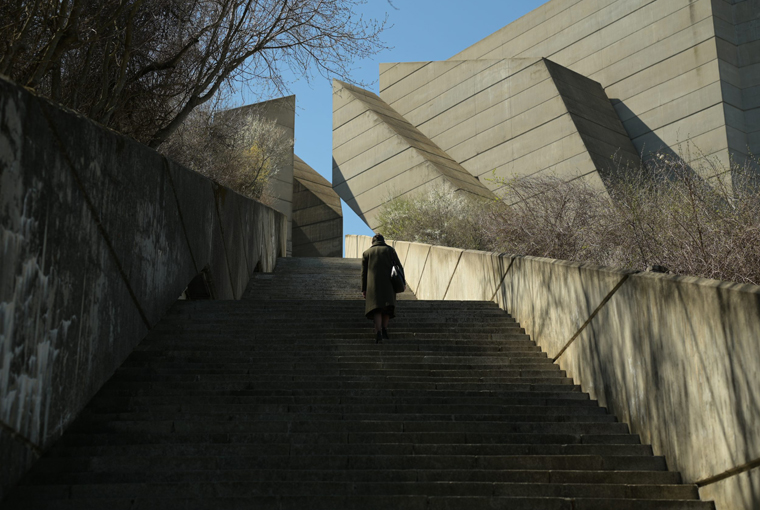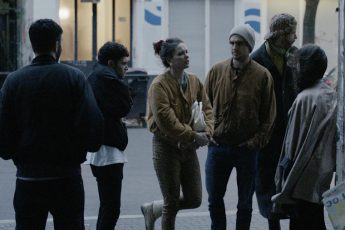Anatomy of a Latter-Life Scam
Stephan Komanderev’s Blaga’s Lessons (Urotcite na Blaga, 2023)
Vol. 138 (October 2023) by Martin Kudláč
Recent developments in Bulgarian cinema reveal a significant shift marked by the emergence of a new wave of filmmakers who are keen to delve into the multifaceted realities of contemporary Bulgarian society. Since the fall of the Iron Curtain and the cessation of state censorship, the nation’s film landscape has become increasingly receptive to a broad array of influences both global and experimental. As a result, today’s Bulgarian directors are unencumbered by the didactic limitations that once characterized their medium, affording them greater freedom to tackle themes of personal and social import.
A salient feature of contemporary Bulgarian cinema is its commitment to various facets of realism, often focusing on pressing social issues such as political corruption, economic disparity, and the challenges faced by marginalized communities. Through these explorations, the films offer a view into the day-to-day experiences of Bulgarians, sharing insights that resonate both universally and within the specific cultural milieu of Central, Eastern and South-Eastern Europe. Emerging filmmakers like Kamen Kalev, Konstantin Bojanov, Dragomir Sholev, Eliza Petkova, Ralitza Petrova, Kristina Grozeva, Petar Valchanov, and Theodore Ushev are key figures in shaping this evolving narrative within Bulgaria’s national cinema.
Stephan Komandarev, an experienced Bulgarian filmmaker and the most recent recipient of the Crystal Globe for Best Film at the Karlovy Vary International Film Festival, stands somewhat apart due to his age. Nonetheless, he continues to be a significant presence in the landscape of contemporary Bulgarian cinema. Komandarev has established a distinct focus in his oeuvre, exploring pressing social, political, and economic issues in Bulgaria through the nuanced experiences of individuals who reside on the periphery of Bulgarian society.
In his most recent film, Blaga’s Lessons, co-written along with Simeon Ventsislavov who has also worked on the director´s previous films, Komandarev returns to familiar thematic terrain. The film probes the socio-economic challenges and existential concerns faced by a segment of society that is often overlooked: retired elderly citizens. Grounded in the Eastern European tradition of social realism – a genre well-represented at film festivals – the narrative centers on Blaga Naumova, a septuagenarian retired teacher of Bulgarian. Blaga is navigating the emotional and logistical complexities of recent widowhood, with her immediate aim being to secure an appropriate final resting place for her late husband, a Communist-era police officer.
Defying initial expectations, the director eschews a solely somber focus on the protagonist, opting instead for a lighter introduction. Blaga interacts with a funeral service employee who attempts to take advantage of her vulnerable situation through various upselling techniques. Constrained by a tight deadline – due in part to stiff competition for premium gravesites as well as escalating costs – Blaga is resolved to find an appropriate grave for her late husband’s ashes before, as she believes, his soul departs the earthly realm.
Komandarev’s initial setup seems more aligned with the conventions of folk comedy than those of social realism drama, indicating a character-driven narrative that later gains in emotional intensity. Blaga is initially portrayed as a somewhat archetypal Eastern European elderly woman, steeped as she is in traditional manners and possessing a somewhat naive but genuine outlook on life. This early characterization, which could be interpreted as an endearing caricature, serves as a lens through which to view the eccentricities of her generation. For example, one such nuance arises when Blaga insists on deviating from the common practice of placing a cross next to the deceased person’s name on the tombstone. Honoring her late husband’s avowed communist beliefs, she opts for a star instead, while she herself, due to her own religious convictions, retains the traditional cross.
Komandarev’s initial approach is subtle and somewhat deceptive. What first seems to be a traditional Eastern European social realism drama focusing on the economic struggles of senior citizens subtly transforms into a nuanced folk comedy that critiques the excesses of unfettered capitalism. As Blaga negotiates with an unscrupulous seller employing questionable upselling tactics, Komandarev employs a form of latent subversion to highlight the extent to which capitalism has taken hold in post-Soviet countries – even shadowing over negotiations over a final resting place. In this narrative, Komandarev is less interested in delivering a moral lesson than in providing an incisive commentary on market dynamics gone awry. Failing to meet the financial demands, Blaga is given a deadline to secure the grave; otherwise, it will be sold to someone else waiting in line. This adds urgency to her quest, especially given her belief that her late husband’s soul needs a proper resting place before departing the earthly realm.
Blaga has set aside a modest sum of money for this specific event, a necessity given her insufficient pension. Her financial situation is further complicated by the fact that her son works abroad as a delivery driver, leaving her to supplement her income by teaching Bulgarian to foreigners seeking citizenship. In an ironic turn, Blaga falls prey to another facet of unchecked capitalism: a phone scam specifically targeting senior citizens. Shifting gears dramatically, Komandarev and editor Nina Altaparmakova now introduce a high-paced sequence in which the protagonist is led to believe that she is aiding a police operation aimed at capturing such very scammers.
In this tense sequence, Blaga finds herself juggling two phone calls simultaneously. On one line, a purported police officer guides her through a set of procedures; on the other, a hostile criminal crudely and explicitly threatens her life, demanding that she throw cash and valuables from her balcony. Reassured by the “police officer” that this is merely a tactical ruse and that her life savings will be returned once the criminal is apprehended, a frightened Blaga complies. However, both phone lines go silent the moment her savings leave her hands. It is only upon her arrival at the local police station that the true nature of her ordeal becomes clear. She is informed that she has been the victim of an elaborate phone scam. Realization dawns on her, leaving her visage drained of color as she fully comprehends the gravity of the situation.
In the film’s initial third, Blaga undergoes a series of disheartening experiences: she is deceived, swindled, robbed, and then treated dismissively by the authorities. Adding insult to injury, her case garners unwanted attention in a local tabloid, which labels her senile for falling prey to a relatively straightforward scam. This public humiliation is particularly stinging given her professional standing as a teacher; her former colleagues inevitably learn of her plight through widespread media coverage. As a final resort, she approaches a local loan shark for assistance. In an ironic twist, the loan shark’s henchman tasked with evaluating Blaga’s assets turns out to be a former student of hers. Back when she was her teacher, she had predicted a lackluster future for him due to his disregard for education – a prediction he clearly resents, as evidenced by his palpable contempt.
Rather than framing the narrative according to the poverty-porn-tinged rules of social realism, Komandarev constructs Blaga’s journey as a social thriller, shedding light on the challenges faced by elderly citizens – a demographic frequently marginalized both in society and on screen. The portrayal gains considerable emotional resonance largely due to the compelling performance by Bulgarian actress Eli Skorcheva. Marking her noteworthy return to cinema after a 30-year absence, Skorcheva does not depict Blaga as a helpless, fragile figure. Instead, she imbues the character with an old-world dignity, evoking a time when social relations were less manipulative and people’s words held weight. Despite the vulnerabilities exposed by her recent widowhood, Skorcheva crafts a nuanced portrait of a woman fiercely determined to maintain her independence and resolve her issues on her own terms. This empathetic depiction underscores that the character’s downfall is not due to any inherent frailty, but rather to her upbringing in a context characterized by a different set of moral and ethical standards. She is a figure who hasn’t fully adjusted to a modern capitalist environment that often exploits specific demographic groups.
Blaga is far from helpless; in addition to offering private lessons, she decides to re-enter the workforce full-time to secure the gravesite, thereby attempting to reverse her cycle of misfortune. Intriguingly, she finds herself involved in the same phone scam that drained her life savings and thus becomes a participant in a gig economy built on scams herself. Komandarev provides an insightful view of the scam’s anatomy, illustrating that a zero-sum game often exists even for the low-ranking operators within this unethical system.
Moreover, Komandarev masterfully shifts cinematic genres as the film progresses. What begins as a social thriller subtly evolves, acquiring elements of crime drama and even nuanced dark comedy. Blaga’s Lessons aligns itself with what Karel Och, the artistic director of the Karlovy Vary International Film Festival, refers to as “elevated genres” – a hybrid of arthouse drama and traditional genre storytelling aimed at wider audience appeal. This unique approach to genre blending was clearly effective; the film garnered the prestigious Grand Prix at Karlovy Vary – the Crystal Globe –, while Skorcheva earned the Best Actress Award for her performance, which is marked by numerous, seamless transformations leading up to the poignant conclusion.
Blaga’s Lessons serves as the concluding installment of Komandarev’s social trilogy, following Directions (Posoki, 2017) and Rounds (V krag, 2019), each of which delves into different aspects of Bulgarian society. The trilogy collectively explores themes of urban dislocation, systemic social deterioration, and ethical uncertainty. Directions examined a nation at an existential juncture, while Rounds scrutinized the disintegration of societal institutions. Blaga’s Lessons, therefore, emerges as a coherent continuation of these themes, spotlighting the growing socio-economic challenges and ineffective institutions that relegate vulnerable individuals to a marginalized existence bordering on second-class citizenship. Gone are the promises of social security associated with Socialism; in its place, a ruthless capitalist economy has retirees grapple with impoverishment, hardship, and neglect. The trilogy suggests that the moral crisis within society has reached a tipping point.
While Komandarev’s observations in Blaga’s Lessons are somber, his approach blends absurd humor and genre sensibilities, steering clear of excessive despair and focusing instead on a dynamically evolving plot. In contrast to Directions, which employs long takes and naturalistic dialog to create an almost documentary-like quality as well as a sense that events are unfolding in real time, Rounds utilizes tighter framing and closer shots to emphasize the characters’ sense of entrapment, mirroring broader societal issues. Blaga’s Lessons, though rooted in the tradition of social realism, distinguishes itself with its cinematographic choices. The camera maintains an intimate proximity to the protagonist, capturing the wide range of emotions she experiences and the difficult decisions she faces. The narrative structure is more constrained; tighter framing and closer shots are used to elevate the story’s tension. In this installment, Komandarev opts for a carefully constructed and staged plot at the expense of the naturalism found in his earlier works. The film culminates in the protagonist’s escalating challenges, compelling her to reassess her longstanding convictions and principles.
With some exaggeration and farcical vestiges, Komandarev’s latest work employs elements of both socio-economic satire and social thriller to explore the vulnerabilities and living conditions of senior citizens in Bulgaria. While remaining rooted in arthouse drama, the film serves as a platform for social commentary, encapsulating a contemporary Faustian narrative that delves into the moral crisis (or crises) plaguing Bulgarian society today.




Blaga’s Lessons is a thought-provoking and insightful film that sheds light on the complexities of identity and belonging. The use of animation is particularly effective in conveying the inner world of the protagonist, and the film’s message about the power of language and culture is timely and relevant. I found myself reflecting on my own experiences and connections to the concepts explored in the film, and I appreciate the depth and nuance of the director’s vision. Highly recommended for anyone interested in exploring the complexities of identity and culture.